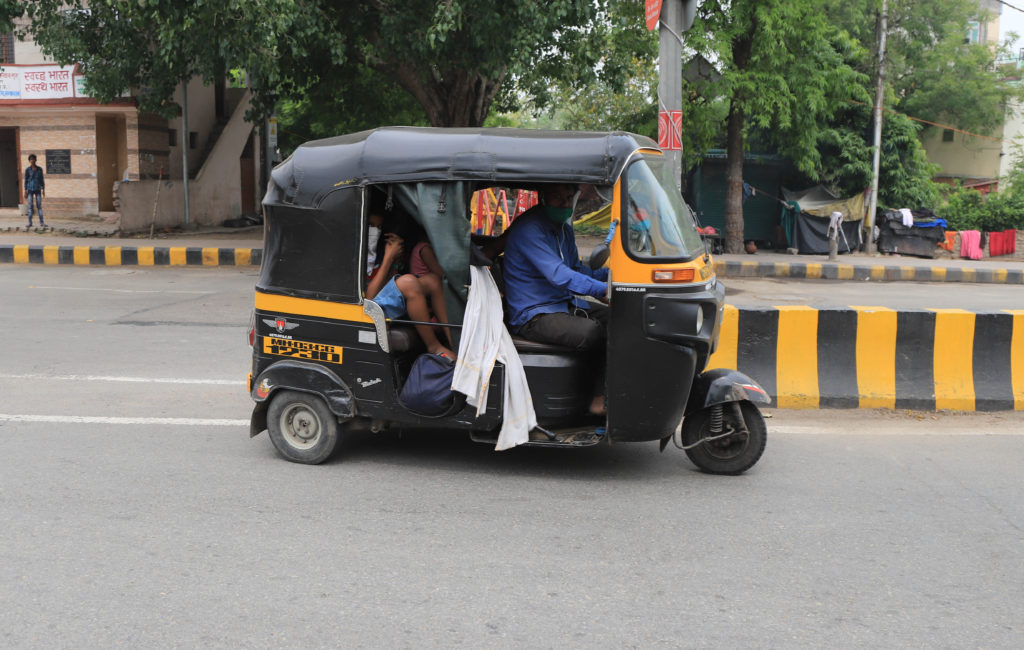The officials in Uttar Pradesh administration say that buses will take migrant workers to home. In daily press briefing the senior government officers churns out numbers of trains that have arrived in UP and number of migrants workers being brought back. Chief Minister Yogi Adityanath asks officers to be polite with these workers and provide them transport. Despite these high sounding words migrant workers continue to walk and cycle back to their homes.
High sounding assurances are coming from all governments – be it centre or state – but these workers do not want to wait any longer. So, they opted for the most challenging option : to walk back home.
Mohammad Imran, a native of Farrukhabad in Uttar Pradesh, was seen walking back to his village from Ajmer with his pregnant wife, children and parents. He walked almost 400 km and reached Agra where he was stopped on Wednesday. “If get a ride it is okay otherwise I will walk with my family. It is better to walk than to die on the roads,” he said.
It is procession of people and hordes of people continued walking or cycling back to their homes from Gujarat, Rajasthan, Karnataka, Madhya Pradesh, Haryana to their native village in Uttar Pradesh. Majority of them tried the helpline number publicised by the government but either the number was nor picked or it was always busy.
This is the story of grit and determination of these people – some of which had a happy ending and some is not that happy.
The Journey that Ended in Death
Tabarak Ansari, 48, worked in a power loom factory in Bhiwandi, Maharashtra. After lockdown he along with his village mate Ramesh Gaud, 28, decided to go back to their village Shishpur village in Maharajganj district in UP. Ramesh made it home but Ansari did not — he died midway on April 30. It was Ansari’s plan to go back to village. He even asked his son and brother to join them but they refused. He was disenchanted with the development and wanted to settle in his village, says Ramesh recalling the tragic journey. When they reached Sidhuan village of Maharashtra Ansari complained of chest pain and dizziness. The locals there did not help and was taken to hospital after a struggle he died, Ramesh recounts. Ansari’s body was buried in Sidhuan village itself as the family did not have money to take the body home.
Insaf Ali, 35, of Mathkhanwa village in Shravasti district was a bit lucky than Ansari as he reached home after walking and hitch-hiking around 1,400 km from Mumbai in almost 14 days. But he died within a few hours after reaching home. The medical report says he died of dehydration. Ali was a helper to a mason in Mumbai. Ali is survived by his wife and two children.
Three migrant labourers of Etah died in a road mishap in Madhya Pradesh. Dalvir Singh was among three Etah-bound migrant workers who died in the accident. He was returning from Tamil Nadu when the tempo they were travelling in overturned. The body was cremated in Hanauna village on Monday
Mother’s Tryst to Protect Daughter

Rukhsana Bano with a daughter,3, Nargis embarked on almost 900 km journey from Indore to Amethi with just one motto to save her daughter from the corona virus. “I tried to hitch a hike but no one stopped. If we don’t get any vehicle we will continue our journey on foot,” she said.
She is part of a team of 8 people, all her relatives, were going home to foot after they failed to get help from the MP or UP governments. Her husband was waiter in a restaurant. After it closed down because of lock down they waited for few days and then decided to go walk to their village n Amethi.
“Situation in Indore was very bad. There was fear that we could also be infected. So, we decided to walk back home because infection was increasing,” she said.
Her husband stayed back as he was not confident with the idea of walking back home. Rukhsana joined a group of relatives returning to Amethi. After a lift on two trucks and a tractor and walking for over 24 hours, they reached home on Tuesday.
Mumbai–Prayagraj: 15,000 km in 6 Days

Autos carrying the Mahrashtra number are quite visible in Prayagraj – erstwhile Allahabad. They travelled 1500 km from Mumbai to Praygraj in six days and spent Rs 15,000 which include suvidha shulk to the police men at the inter-state borders.
Majority of these people are auto drivers who plied auto in Mumbai. After lockdown when their `dhanda’ died down they decided to return home. Ramesh Chaurasia is one of those enterprising autodrivers. He spoke to is friends who chipped in money and they decided to return home.
“We travelled 300-400 km per day and it took almost 6 days to reach Praygraj,” he said.
When asked were they not stopped at intre-state borders he said: paisa bolta hai.
